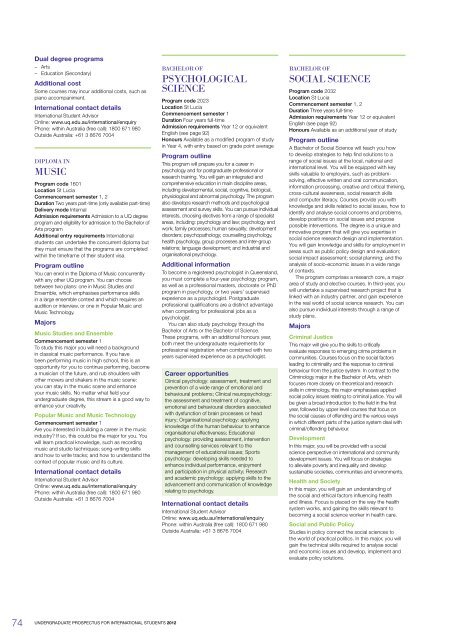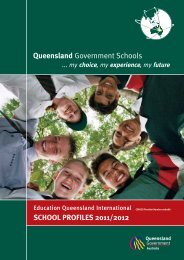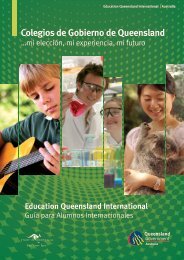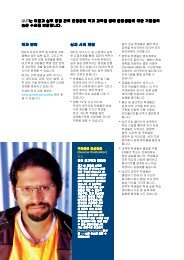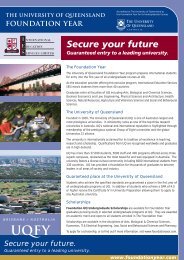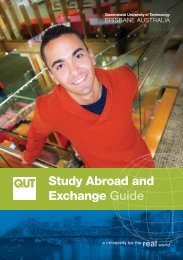UNDERgRADUATE PROSPECTUS - Study Brisbane
UNDERgRADUATE PROSPECTUS - Study Brisbane
UNDERgRADUATE PROSPECTUS - Study Brisbane
- No tags were found...
You also want an ePaper? Increase the reach of your titles
YUMPU automatically turns print PDFs into web optimized ePapers that Google loves.
Dual degree programs<br />
– Arts<br />
– Education (Secondary)<br />
Additional cost<br />
Some courses may incur additional costs, such as<br />
piano accompaniment.<br />
International contact details<br />
International Student Advisor<br />
Online: www.uq.edu.au/international/enquiry<br />
Phone: within Australia (free call): 1800 671 980<br />
Outside Australia: +61 3 8676 7004<br />
Diploma in<br />
Music<br />
Program code 1601<br />
Location St Lucia<br />
Commencement semester 1, 2<br />
Duration Two years part-time (only available part-time)<br />
Delivery mode Internal<br />
Admission requirements Admission to a UQ degree<br />
program and eligibility for admission to the Bachelor of<br />
Arts program<br />
Additional entry requirements International<br />
students can undertake the concurrent diploma but<br />
they must ensure that the programs are completed<br />
within the timeframe of their student visa.<br />
Program outline<br />
You can enrol in the Diploma of Music concurrently<br />
with any other UQ program. You can choose<br />
between two plans: one in Music Studies and<br />
Ensemble, which emphasises performance skills<br />
in a large ensemble context and which requires an<br />
audition or interview, or one in Popular Music and<br />
Music Technology.<br />
Majors<br />
Music Studies and Ensemble<br />
Commencement semester 1<br />
To study this major you will need a background<br />
in classical music performance. If you have<br />
been performing music in high school, this is an<br />
opportunity for you to continue performing, become<br />
a musician of the future, and rub shoulders with<br />
other movers and shakers in the music scene:<br />
you can stay in the music scene and enhance<br />
your music skills. No matter what field your<br />
undergraduate degree, this stream is a good way to<br />
enhance your creativity.<br />
Popular Music and Music Technology<br />
Commencement semester 1<br />
Are you interested in building a career in the music<br />
industry? If so, this could be the major for you. You<br />
will learn practical knowledge, such as recording<br />
music and studio techniques; song-writing skills<br />
and how to write tracks; and how to understand the<br />
context of popular music and its culture.<br />
International contact details<br />
International Student Advisor<br />
Online: www.uq.edu.au/international/enquiry<br />
Phone: within Australia (free call): 1800 671 980<br />
Outside Australia: +61 3 8676 7004<br />
Bachelor of<br />
Psychological<br />
Science<br />
Program code 2023<br />
Location St Lucia<br />
Commencement semester 1<br />
Duration Four years full-time<br />
Admission requirements Year 12 or equivalent<br />
English (see page 92)<br />
Honours Available as a modified program of study<br />
in Year 4, with entry based on grade point average<br />
Program outline<br />
This program will prepare you for a career in<br />
psychology and for postgraduate professional or<br />
research training. You will gain an integrated and<br />
comprehensive education in main discipline areas,<br />
including developmental, social, cognitive, biological,<br />
physiological and abnormal psychology. The program<br />
also develops research methods and psychological<br />
assessment and survey skills. You can pursue individual<br />
interests, choosing electives from a range of specialist<br />
areas, including: psychology and law; psychology and<br />
work; family processes; human sexuality; development<br />
disorders; psychopathology; counselling psychology,<br />
health psychology, group processes and inter-group<br />
relations; language development; and industrial and<br />
organisational psychology.<br />
Additional information<br />
To become a registered psychologist in Queensland,<br />
you must complete a four-year psychology program,<br />
as well as a professional masters, doctorate or PhD<br />
program in psychology, or two years’ supervised<br />
experience as a psychologist. Postgraduate<br />
professional qualifications are a distinct advantage<br />
when competing for professional jobs as a<br />
psychologist.<br />
You can also study psychology through the<br />
Bachelor of Arts or the Bachelor of Science.<br />
These programs, with an additional honours year,<br />
both meet the undergraduate requirements for<br />
professional registration when combined with two<br />
years supervised experience as a psychologist.<br />
Career opportunities<br />
Clinical psychology: assessment, treatment and<br />
prevention of a wide range of emotional and<br />
behavioural problems; Clinical neuropsychology:<br />
the assessment and treatment of cognitive,<br />
emotional and behavioural disorders associated<br />
with dysfunction of brain processes or head<br />
injury; Organisational psychology: applying<br />
knowledge of the human behaviour to enhance<br />
organisational effectiveness; Educational<br />
psychology: providing assessment, intervention<br />
and counselling services relevant to the<br />
management of educational issues; Sports<br />
psychology: developing skills needed to<br />
enhance individual performance, enjoyment<br />
and participation in physical activity; Research<br />
and academic psychology: applying skills to the<br />
advancement and communication of knowledge<br />
relating to psychology.<br />
International contact details<br />
International Student Advisor<br />
Online: www.uq.edu.au/international/enquiry<br />
Phone: within Australia (free call): 1800 671 980<br />
Outside Australia: +61 3 8676 7004<br />
Bachelor of<br />
Social Science<br />
Program code 2032<br />
Location St Lucia<br />
Commencement semester 1, 2<br />
Duration Three years full-time<br />
Admission requirements Year 12 or equivalent<br />
English (see page 92)<br />
Honours Available as an additional year of study<br />
Program outline<br />
A Bachelor of Social Science will teach you how<br />
to develop strategies to help find solutions to a<br />
range of social issues at the local, national and<br />
international level. You will be equipped with key<br />
skills valuable to employers, such as problemsolving,<br />
effective written and oral communication,<br />
information processing, creative and critical thinking,<br />
cross-cultural awareness, social research skills<br />
and computer literacy. Courses provide you with<br />
knowledge and skills related to social issues, how to<br />
identify and analyse social concerns and problems,<br />
develop positions on social issues and propose<br />
possible interventions. The degree is a unique and<br />
innovative program that will give you expertise in<br />
social science research design and implementation.<br />
You will gain knowledge and skills for employment in<br />
areas such as public policy design and evaluation;<br />
social impact assessment; social planning; and the<br />
analysis of socio-economic issues in a wide range<br />
of contexts.<br />
The program comprises a research core, a major<br />
area of study and elective courses. In third-year, you<br />
will undertake a supervised research project that is<br />
linked with an industry partner, and gain experience<br />
in the real world of social science research. You can<br />
also pursue individual interests through a range of<br />
study plans.<br />
Majors<br />
Criminal Justice<br />
This major will give you the skills to critically<br />
evaluate responses to emerging crime problems in<br />
communities. Courses focus on the social factors<br />
leading to criminality and the response to criminal<br />
behaviour from the justice system. In contrast to the<br />
Criminology major in the Bachelor of Arts, which<br />
focuses more closely on theoretical and research<br />
skills in criminology, this major emphasises applied<br />
social policy issues relating to criminal justice. You will<br />
be given a broad introduction to the field in the first<br />
year, followed by upper level courses that focus on<br />
the social causes of offending and the various ways<br />
in which different parts of the justice system deal with<br />
criminal/offending behaviour.<br />
Development<br />
In this major, you will be provided with a social<br />
science perspective on international and community<br />
development issues. You will focus on strategies<br />
to alleviate poverty and inequality and develop<br />
sustainable societies, communities and environments.<br />
Health and Society<br />
In this major, you will gain an understanding of<br />
the social and ethical factors influencing health<br />
and illness. Focus is placed on the way the health<br />
system works, and gaining the skills relevant to<br />
becoming a social science worker in health care.<br />
Social and Public Policy<br />
Studies in policy connect the social sciences to<br />
the world of practical politics. In this major, you will<br />
gain the technical skills required to analyse social<br />
and economic issues and develop, implement and<br />
evaluate policy solutions.<br />
74<br />
UNDERGRADUATE <strong>PROSPECTUS</strong> FOR INTERNATIONAL STUDENTS 2012


